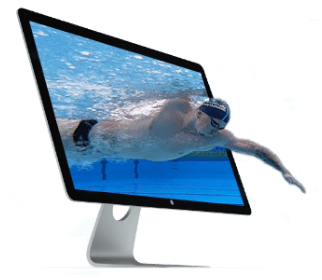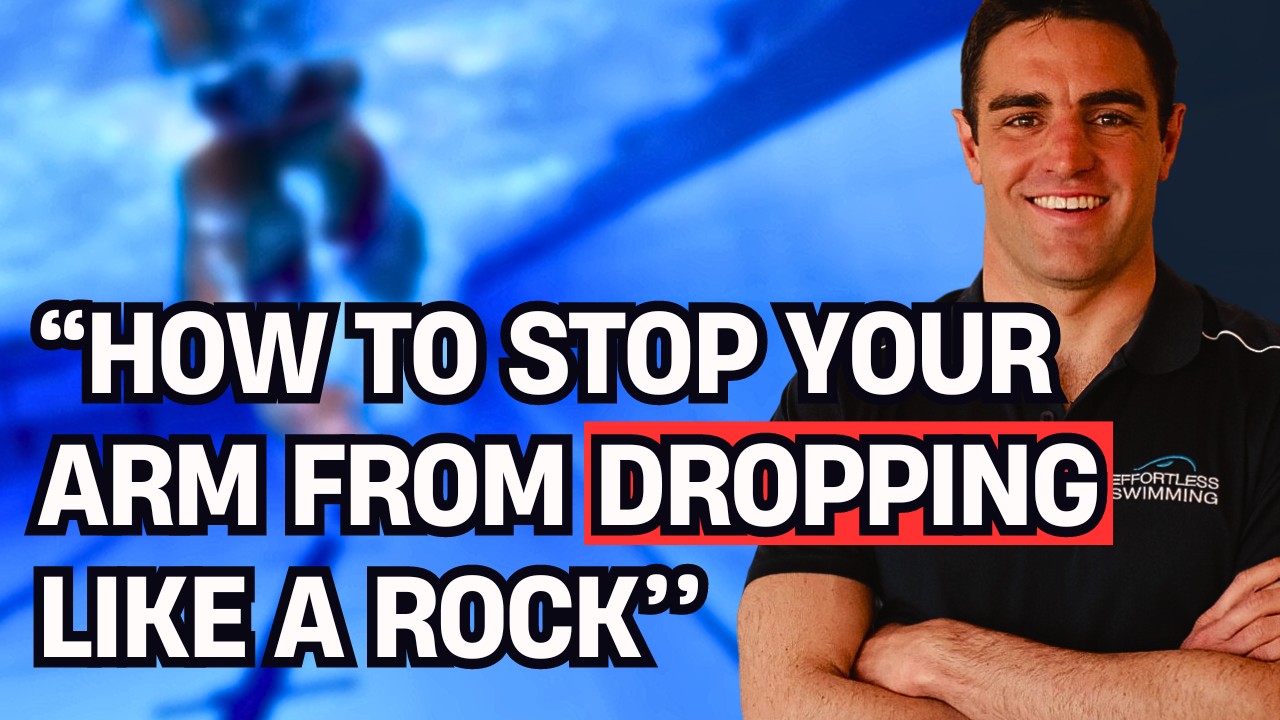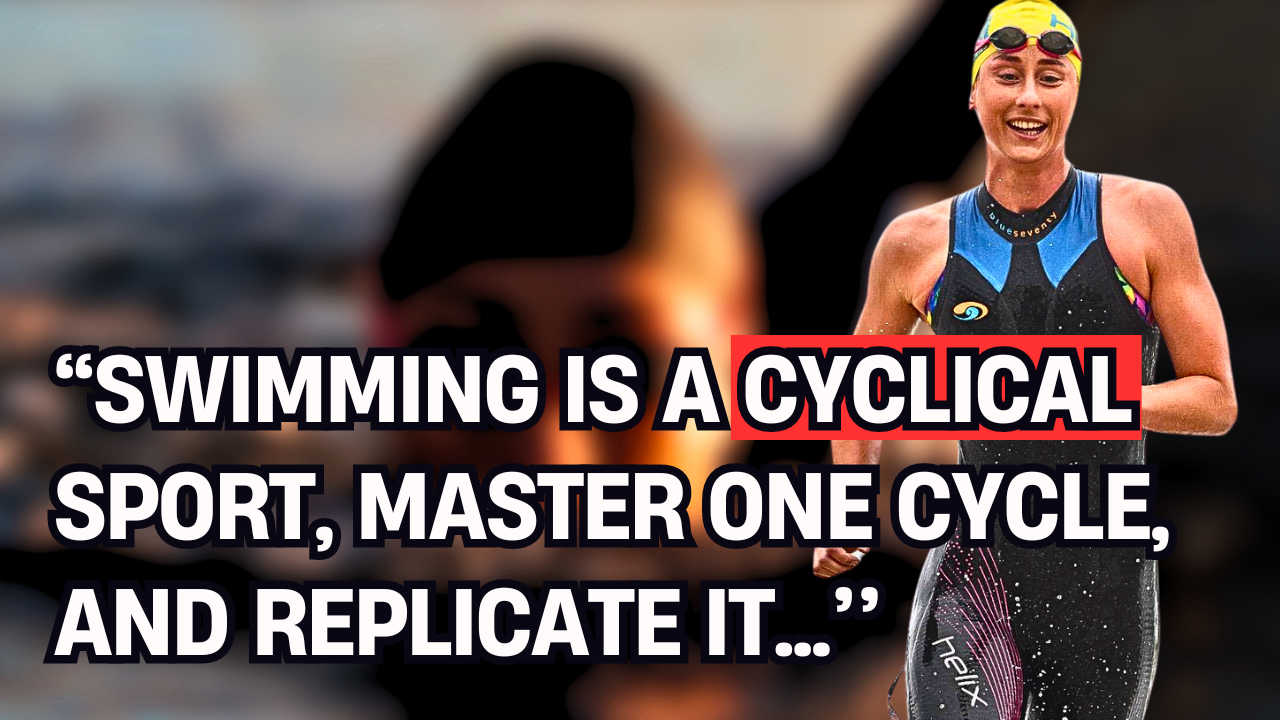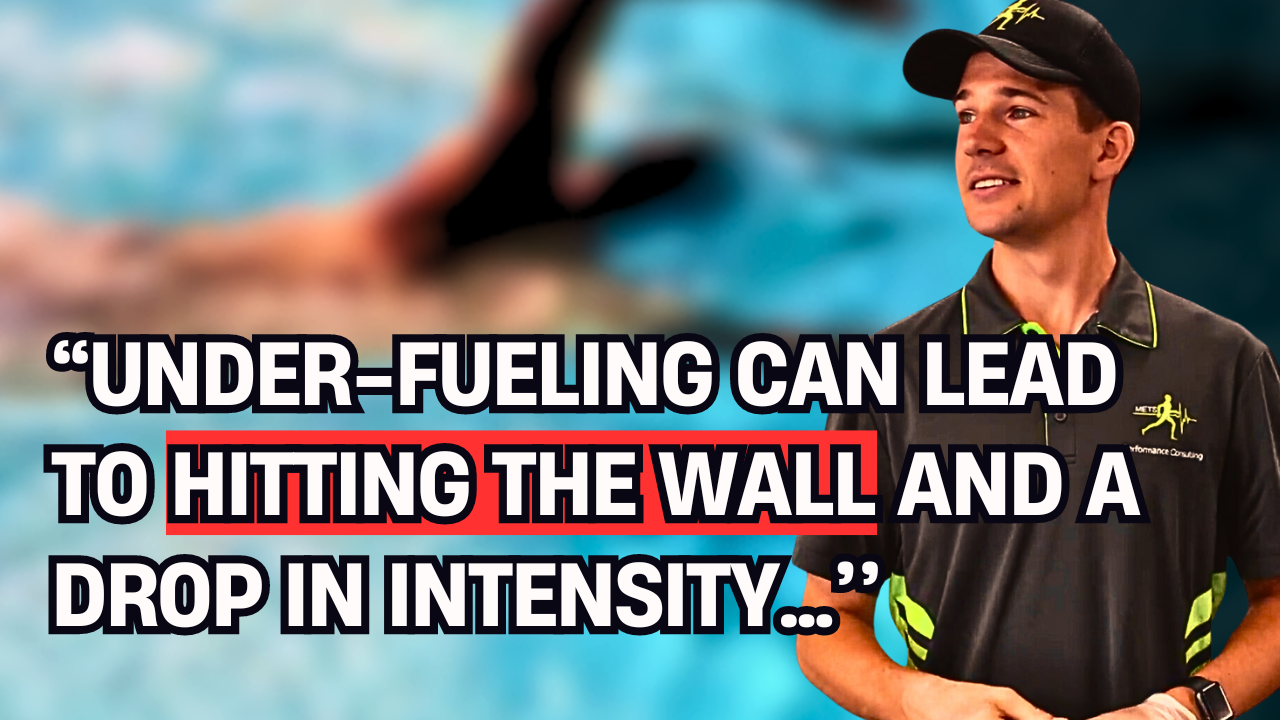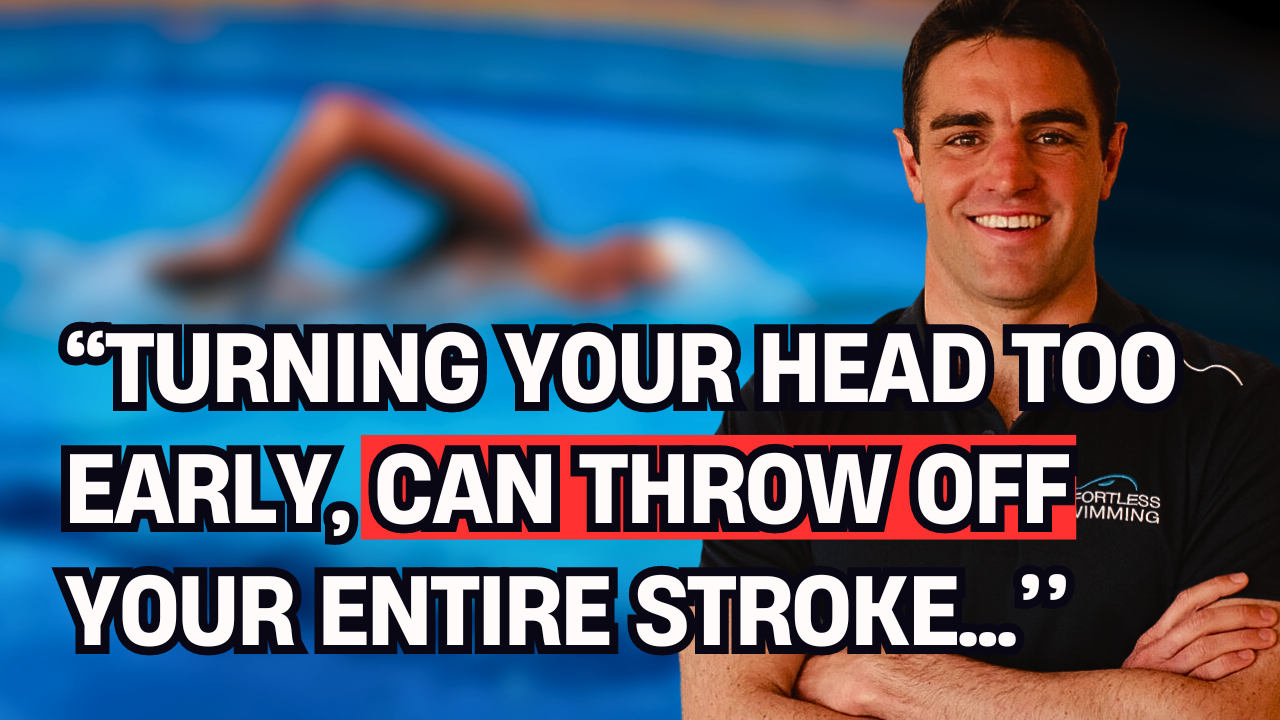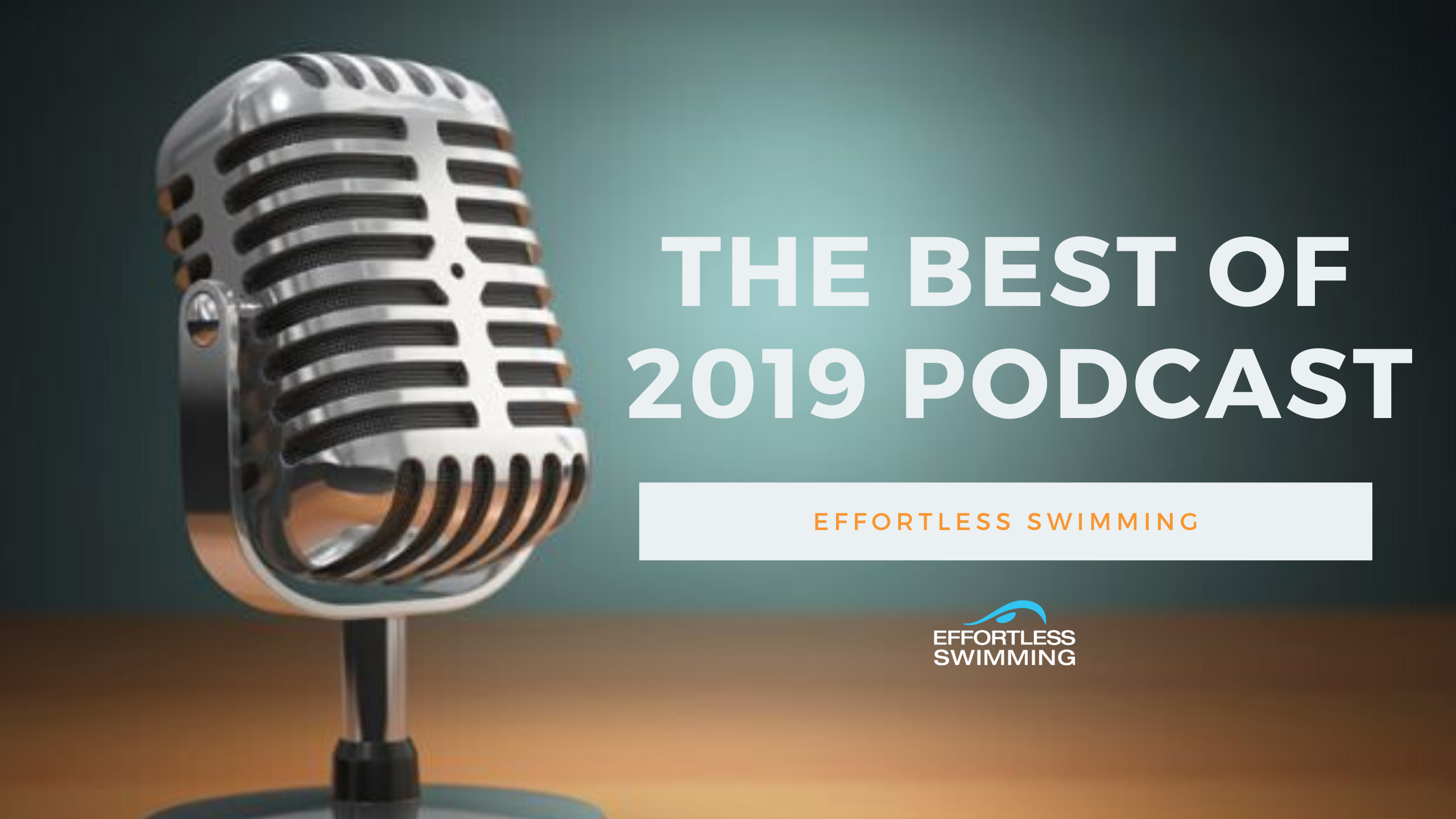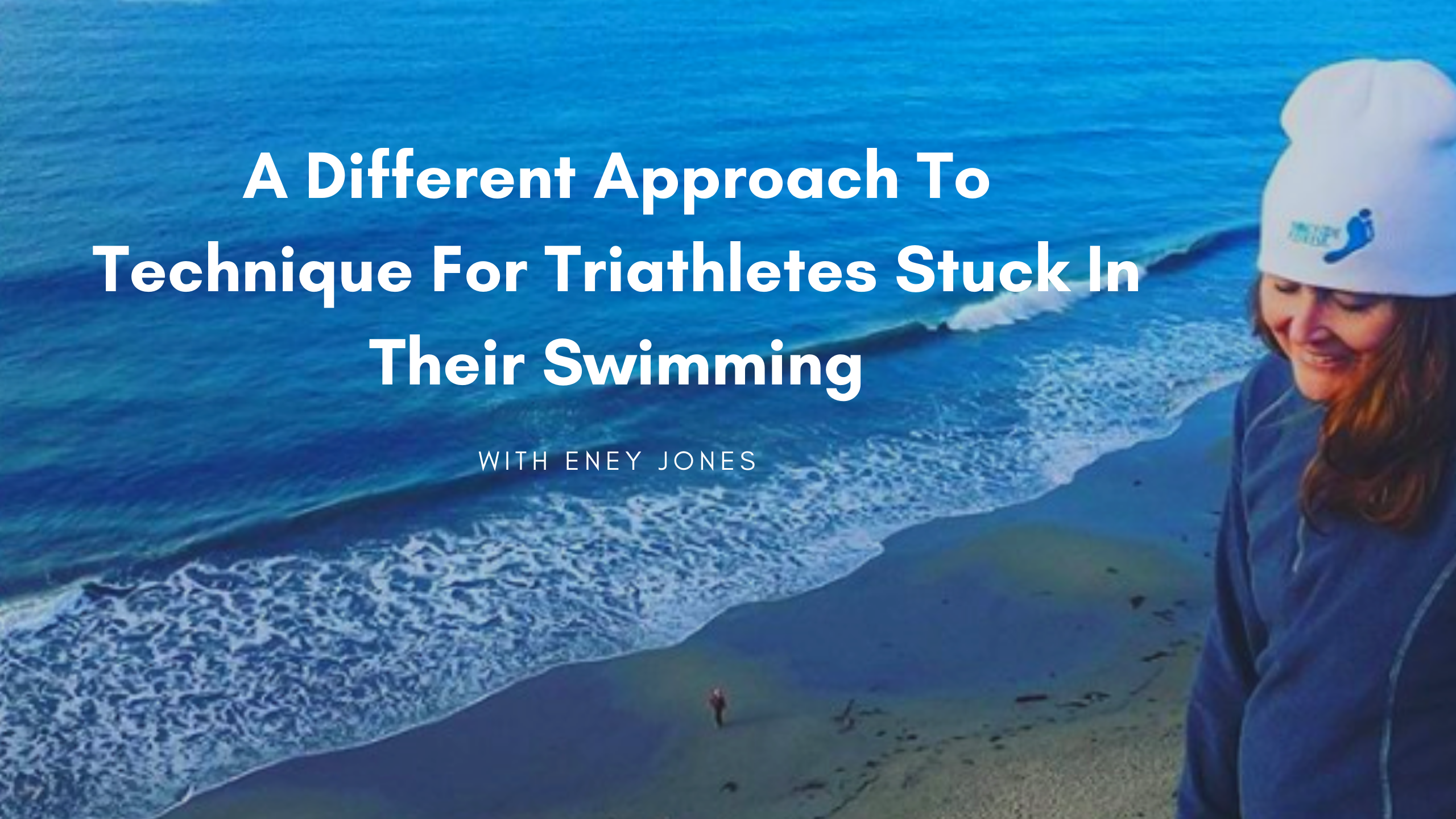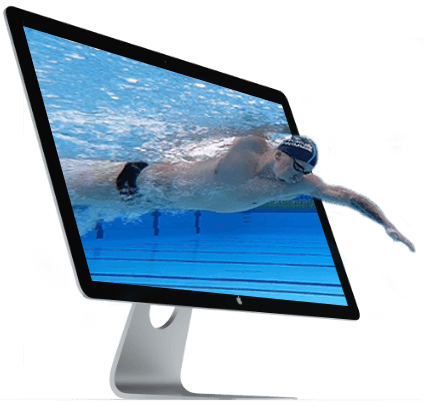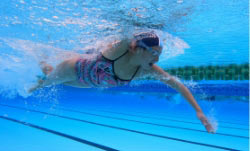Our guest today is Harriet Brown who is a World Ironwoman Champion, Nutri-Grain Ironwoman Series Champion, Australian Team Captain, and Molokai to Oahu Paddle Board Champion.
01:26 Underwater Filming
03:10 Injury During Championship
05:14 Being Out For The Whole Season
07:18 Exercise Makes You Happy
07:51 Injury As A Positive Experience
08:54 Having Some Time Off
10:45 Considering A Career After Sports
11:59 Molokai to Oahu Paddle
14:32 Cut The Race Into Little Parts
16:20 “You Are Lucky To Be Here”
17:00 What Do You Tell Yourself To Keep You Going?
19:03 Good Races And Bad Races
20:10 You Have To Stay Present
21:20 What Do You Love About Racing?
25:03 Managing Three Sessions A Day, Six Days A Week Of Training
27:09 Sleep Is The Best Form Of Recovery
31:29 We Cope With Load Differently
Effortless Swimming Camps
Noosa
Hawaii Swim Camp
2020 Hell Week Camp (Thailand)
Online Membership
Freestyle Clinics Around Australia
Transcription:
Brenton: So Harriet, thanks for joining me on the podcast. I’ve known about you for a couple of years. I went to college with your sister. And then sort of met you a couple of times down at the Pier to Pub in Melbourne. And we got to catch up and do some underwater filming at the, a couple of months ago, on the Gold Coast. And, I posted that footage on our Instagram. And I think people really appreciated seeing your stroke underwater because you’ve got such a nice stroke. And it was really good to be able to see that. And we were talking before, and you were saying it’s, you haven’t really had much underwater footage taken. And what was it like for you to be able to sort of see what it, how you swim? And then be able to translate that back to your own training and your technique.
Harriet: Yeah. Thanks for having me on. That technique session that you did with me with the underwater footage has actually helped me so much. I’m a bit more of a visual learner, and to actually see what I was doing and to make a few of those changes, taking it back to swimming has really helped me. I think the number one thing that helped me the most is that, so you were mentioning that I was coming across too far in my stroke, across my body and I need to keep it more in line with my shoulder. And since I’ve made those changes, I haven’t had shoulder issues. Which I’ve had ongoing for my whole career, my whole swimming career. So it’s been awesome. Thank you.
Brenton: Yeah, well you were saying that your coaches mentioned it to you a lot of times, about that that crossover at the front of the stroke. But it’s not until you actually saw it that you fully understood how far across your where coming. And, it’s just one of those things, isn’t it? That it’s very hard, what you’re perceived to be doing is very different than what you’re actually doing. And, it’s great to hear that you haven’t had those shoulder injuries.
Brenton: And one of the things that you tend to see in that, when you slow footage down, is you look at some of the positions that the shoulder is in through the stroke. And, let’s say it is across the body it can be in quite an uncomfortable position. And, if you’re doing several thousand strokes across the course of a week, it kind of makes sense that there would be issues there. So, it’s really good to hear that it’s helped with your shoulders. And speaking of injuries, at the end of last year you had probably one of the worst injuries that you’ve had. And it happened to be in the World Championships for the Surf Life segment. You are Australian Team Captain and you managed to break your foot on the first day. Do you want to tell that story and what happened there?
Harriet: Yeah that was a pretty tough time. So we headed to Adelaide for the World Championships, not the most exciting place we’ve raced for Worlds before. But regardless, we were all ready to race. Being part of the Australian team was such an honor. And especially being Captain I felt like there was, yeah, a little bit riding on results and just having a really good hit out. Because we haven’t beaten, so the Australian team hasn’t beaten the New Zealand team for about eight years. And that was our goal for the competition. And, in the first race I ran into the water, stood on a rock, and split my foot. And I knew it was, there was something going on. It was really, really painful. But there were no substitutes in our team. So I knew that I had to race on it for another 10 events over that weekend, so across three days.
Harriet: And so, strapped it up, took some painkillers and kept racing. And, it was probably one of the hardest things I’ve ever had to do. It’s almost like when you have to put your hand on like a hot stove and you know it’s going to hurt, but you have to do it anyway. Racing on a sore foot like that was probably like that. But I didn’t actually know how severe it was until we finished the competition. The Australian team actually won, which was awesome. The team definitely pulled through for me. I did okay. But yeah, it was a bit of a tough, tough weekend. Bitter sweet for me. I flew back home and found out that I needed surgery, three screws in my foot and I was out for the season.
Brenton: And, what was it like having to basically sit still for a number of weeks and just not be able to stay as active as you used to?
Harriet: Yeah, that was actually, physically it wasn’t too bad. So I kept myself occupied with doing things, reading books, learning, kind of making the most of some downtime to see friends and that kind of thing. But after a few days of that, I found that I wasn’t really that happy. And not because of what I was doing or not. I was pretty disappointed that I didn’t get to race, and I was out for the whole season and I was doing so well.
Harriet: But it wasn’t until I went to the gym, I think it was about six days after surgery, and just did a little bit of movement and came out of that just with the endorphins sailing high that I realized that my body just misses exercise and craves exercise to keep my mind happy and my body happy. So, after that I just took some small steps. Every couple of days I’d do a little bit of exercise, couldn’t do too much. So, sometimes it was just some dumbbells in the gym, or some activation exercises. But that kind of kept me sane while I was moving through the process.
Harriet: And, it was a tough time because all my friends were racing. I was currently leading the NetScreen series at the time. So I was feeling really great with my competition. But I guess those things happen. And I just had to accept it. I had a time frame, which was the season out. So I think once you’ve been given, like I’ve had knee injuries over the past and that’s kind of difficult because you never know when you’ll be back. Whereas with this one, I knew that I had a break. And so I just started writing little goals and each week I’d try and get a little bit stronger.
Harriet: And just, yeah, work on toning up to do a little bit of movement, but enjoy some sleep in’s as well. So at the beginning it was really tough, but then I started to enjoy it a little bit more. And I realized, one of the biggest things I realized, well one is that exercise actually makes you happy. Which, after doing it my whole life, you just kind of take that for granted, that feeling of fitness. But the other thing I learned too is how much more productive you can be in a day when you’re not completely exhausted from training. We train three times a day, six days a week, so I got a few more things done. So, that was nice.
Brenton: Yeah. So I mean it’s still somewhat early days, it’s about 12 months after doing it. But, do you feel like you were able to, looking back it’s been in a way a positive experience? Where you’ve been able to take some things out of it where you can actually, where you’ve felt like you’ve grown as a personal level, or become a bit wiser with it?
Harriet: Definitely. I think any athlete, or anyone who goes through hardship at the end of it they always say, “Oh, that was the best thing that ever happened to me. That was a blessing in disguise”. And at the time people kept saying to me, “You’ll learn from this, you’ll grow. And you’ll come back bigger and better”. And at the time it’s really, really, really hard to believe that and hard to take on board that positivity. But I really did try and make the most of that downtime. And now that I’m back racing again, I had my first race back in the series at Burley a few weeks ago, and ended up coming third. So I was really, really happy about that. I just love racing and being back in that feeling again. But having some time off for me was actually a really good thing. Because I’ve raced in the professional series, so trained for Ironman for the last 10 years ever since I finished school. And I’ve never really had much of a break.
Harriet: And so to have time off it kind of made me think about, a little bit, more about a career after sport. Or, just get a little bit of a taste for that transition into retirement when Surf Lifesaving isn’t my whole life. So, I took onboard lots of different opportunities and said yes to lots of things that I would’ve never done if I was just focused on training all the time. So, in that way it was a blessing in disguise. And now I come back and I miss training and I don’t take it for granted. And I try not to whinge about it when it’s cold because I know that for so long I wasn’t able to do that.
Brenton: Yeah, it’s certainly as soon as you can’t do something, you’re getting a much better appreciation for it. I came off the mountain bike four weeks ago and I’m just starting to be able to swim again. And, before that I was probably swimming the best I ever had and I was really enjoying it. I wasn’t taking it for granted at the time, but now I just think, “Oh, if I can’t swim and surf, I’m not the happiest of people”. So now that, I’m glad that I can get back into it, but I’ve still got to take it steady for probably another, I don’t know, four to eight weeks.
Brenton: But, in it right now it’s like, yeah, I can’t see it being a necessarily positive experience, but I’m sure it will be by the time that I can fully recover and look back and there’ll be something that I can take out of it. But it is good to have that break, because it certainly gives you the appreciation that you may not other otherwise have when you’re in the thick of it. Especially for 10 years. I mean that’s a long time to be training that much and it’s, what was it like for you to sort of get a taste of what it might be like to not be able to train as much if you are working full time? Or, what sort of clarity did you get around what you might do after sport?
Harriet: I’m actually really excited for life after sport. I think I will always continue to do sport, and train and take on some little goals along the way. But, it does make me look forward to that. I’m not ready for it just yet. I still love racing and I still feel like my body’s holding in there and it’s got a lot more to give. But yeah, getting a bit of a taste of different things that I can do. I work as an exercise physiologist, and so I took advantage of a few different things that I might like to do later on. Nothing’s set in stone. I did commentary for the Australian titles and the state championships. And I organized a Sports Conference, which we ran on the Gold Coast in May last year. So just dabbling in a few different things that I really get a lot of satisfaction out of doing new things and challenging myself in a way that’s not necessarily physical.
Brenton: Yeah, that’s good. And, one of the other events that you’ve done is the Molokai to Oahu paddle. Now, is that 42 kilometers from Island to Island? Is that right?
Harriet: 52.
Brenton: 52.
Harriet: 32 miles. 52 kilometers. Yes.
Brenton: Oh so I was short.
Harriet: Yeah. No, it’s a long, long way. Don’t take those last 10 kilometers. They’re the worst. So don’t take those ones off. Yeah, it’s a huge race. The Molokai to Oahu, it’s one of my favorite events. I have done it three times now. And it’s a crossing from one Island to another in Hawaii. And you fly over the day before to Molokai, and that’s probably the craziest thing. You look out the window and see where you’ll be paddling back from the next day. And that’s really, really daunting. And it does scare me a lot seeing that. And then on the next day we all wake up on that Island and we start the race.
Harriet: And at the beginning you genuinely… Normally you can’t see Oahu where you’re paddling to, so you kind of out in the open ocean and it’s really, really rough. It’s called the channel of the bones. It’s one of the deepest shipping channels in the world, I think. Not too sure. Anyway, it’s really dangerous, really rough. But that’s why we love it too because sometimes you get the best swell and the best runners pushing through there. So it’s a pretty cool race. And there’s a support pro that goes along and feeds you. Well, my sister came with me this year and jumped off and switched my drinking bottles around and gave me some gels. And yeah, it was really tough. This year was probably the toughest. I was coming second all the way until the last two kilometers and we had a sprint finish. Which, when you’re paddling for five hours is mentally really tough.
Brenton: What was it like having to dig that deep after 50 kilometers of paddling? Had you been to that place before in different races, or was this something on a whole new level for you?
Harriet: Molokai is a whole new level for me. Generally when we race in the Nutri-Grain series, the races go up to about an hour. Whereas this one is five hours of paddling and you’re on your own out in the middle of the ocean. You have your support boat there, but you can’t really talk to them because there’s so much chop and wind and swell. So, it really is just five hours of me and my thoughts. And you go into some pretty dark places.
Harriet: This year I definitely did. There were moments during the race that I wanted to stop. I really did. My shoulder started getting sore, and I was really worried about it. And I didn’t feel strong. And it’s amazing how your mind can really take over with those negative thoughts. And I got myself into that point of nearly wanting to pull out, but you have to pull yourself out of that. And I’ve done it through training. I’ve got to some pretty low points, and then really tried to work on that positive self talk and turn it around and just cut up the race into little parts.
Harriet: If you think about a 52 kilometer paddle, that seems like a long way. But if you think, all right, just another half an hour of focus. And catch this runner, and catch the next runner, and try and catch Lizzie, who is my friend. She ended up coming second, but she was ahead of me most of the way. So I was really just focusing on trying to catch up to her a little bit. And for that amount of time, it’s such a mental game and you go on a roller coaster of emotions. And then sometimes I feel like I’m distracted and I’m thinking about other things. And then I’m like, “No Harriet. Back to the race. Focus on what you’re doing.”
Harriet: And there’s flying fish jumping out of the water and turtles and some other paddlers around that you start to see. And there’s also the tracking as well, so you need to make sure that you’re on the right line. Because the currents change, the swell change, the tides change. So you kind of make a plan with your support crew during the day, the morning before. But things change throughout the day so you kind of have to read the ocean as well. So it’s a pretty cool race. It’s really, really challenging just paddling with your arms for that amount of time. But it’s super satisfying at the end when you finish it.
Brenton: Oh, it would be. When I did the Rottnest channel swim last year, about 15 Ks in, I started to have those dark thoughts. And I had to tell myself, “You’re lucky to be here. A lot of people wouldn’t get the chance to do this”. And I just had to convince myself that I was lucky to be doing the race. And that eventually got me through. But geez, I don’t think, I probably went that sort of deep with how bad it felt at the very end of the Iron Man I did in 2016. But it was just like, it was a really hard thing. And I wanted to pull out because I was cold, my arms didn’t have much left and it was a hard thing to stay in there. And, what’s some of those thoughts that you told yourself to keep you going? Or, was it more of just like, “Just take it one 500 meters at a time”?
Harriet: Yeah, it was a bit about taking it 500 meters at a time. But I think also when those dark thoughts come in, you’re trying to figure out what’s rational and what’s not. And I think, you might have felt it too, you’re cold. And you know that if you’re really cold and your body’s hurting, that there is a chance that you can do some damage. So I think you start to say to yourself, “Oh, maybe I should pull out. Like maybe.” With me it was my shoulder, “Maybe I should pull out. Maybe this will stuff me up for the rest of the season”. But then you don’t know whether you’re just giving yourself that out and giving yourself kind of an option to pull out.
Harriet: So those were like these two dialogues in my head. One is like, “It’s fine, like you’ve done really well. No one will care. It doesn’t really matter. You might hurt your shoulder”. And then the other one was like, “No way. If you hurt your shoulder, you can deal with it later. You’ve dealt with your foot surgery. It’s really not that bad. You haven’t broken anything”. It was a bit of bursitis. So inflammation, I found out a bit of tendonitis. But, and I was like, “You’ve come all the way over here”. Just that self talk of, “You’ve set yourself a goal. Just do everything you can to achieve it and you’ll feel satisfied. Much more satisfied at the end of just completing it, no matter what you come”.
Harriet: Because I think that’s also where the negative thoughts come in is when you’re probably not sitting in a position that you’d like to. When you’re at the front doing really well, or on track with your time, it’s so easy to feel positive and feel good about yourself. Whereas when you’re sitting in behind, or you’re not on track with your time, that’s when those negative thoughts take over too. So I try not to think about the placing, and more to think about that next runner, that next 500 meters. And also we were broken up by every half an hour I’d take a gel. So, that would be something I’d look forward to.
Brenton: Yeah, and that’s all it needs to be sometimes too. Like in the Rottnest swim I was doing, yeah, every half an hour. And it’s just like, “All right, I’ll get to the next. I’ll get to the next gel, or the next feed, and then I can make a decision then.” And it’s like, “Oh, okay. Now I feel fine. I’ll get to the next one and keep going”. And eventually it gets you there. And I was talking to a friend of mine, Mitch Kibbey, he’s a professional triathlete. And we’re just talking about, well he was talking about when he’s had good races and races that haven’t been so good.
Brenton: And, oftentimes the races that haven’t been so good, aside from any sort of physical things that sort of might come up, it’s been when he’s projected too far ahead. He’s been looking too much towards the finish line. Whereas the races he’s done well, it’s just been, he’s been very present. Being focused on what’s happening right now and just taking it one step at a time. And, I think there’s a lot of truth to that where if we’re thinking, if you’re thinking about the last kilometer sprint and you’re only half way, your mind is really distracted from the task at hand. And then it doesn’t allow you to enjoy or just really focus on what’s happening at the time.
Harriet: Absolutely. Those are very, very wise words. And I try and take that on board through all of my racing. Because it’s so easy when you’re in the middle of a race sitting there being like, “Oh, this is good. I might come third. Or, I wonder if there’s a sprint finish if I can do that”. Whereas especially when I’m doing surfing and woman racing, we have to be present. Because I’m paddling and then a big wave comes and you have to decide, “Do I pop? Do I go over the top? Do I roll to go underneath it? And then I jump back on? And then on the way in, do I go towards the left to try and catch the runners or the waves over there? Or, do I go to the right and then when do I jump up? Is it too shallow? Is it too deep?”
Harriet: There’s so many decisions throughout a race that you have to stay present. Because as soon as you start to think too far ahead, which I tend to do sometimes, and I really have to stop myself and get back to being in the process. And I think everyone can relate to that with whatever race you are doing. And especially, I think people that look at time and they’re really judging themselves by the time as well. That’s when they start to think too far ahead.
Brenton: Yeah. Yeah, absolutely. And, what is it that you love about racing?
Harriet: Oh. Well, I love my sport. I love surf lifesaving. I love being in the ocean. I grew up doing a lot of different sports. Up until 18 I did about five different sports. Not all of them all that well, but I loved surf lifesaving. One because I was naturally not too bad at it. But two, I just loved being at the beach and being in the ocean. And I love that you can turn up to a race and you’ve got so many different things going on. You never know what you’re going to get. So the ocean is different every day. I love that factor. That’s probably more what I love about training, actually. Turning up to the office and it’s different every day.
Harriet: What I love about racing is I love challenging myself to get to the position that I feel as fit as I can. So, you gradually building up training, you’re trying to go faster in the pool, or you’re trying to go fast on the track, on the board, on the ski. And factor in that recovery. And it’s just such a science behind it all. But when it comes to the race you stand. I love the feeling of standing on the line knowing that I’ve done everything possible that I can to get myself in the best possible fitness feeling. So it’s kind of like a body thing that you feel.
Harriet: I don’t know if I can explain this really very well. But I love pushing myself to see how hard I can go, and feeling really fit. So then when you stand on the line, you feel confident. I hate turning up to a race and not feeling good. I don’t like racing like that. So, what I love about racing is feeling like I’m ready to go and I’m ready to fire. And I feel fast and powerful and fit and strong. That’s what I love about racing. And it’s also like it’s great when you win and you achieve your goals, but it’s also great when you do good things like make good decisions. Or feel like you’ve pushed yourself further than mentally, then you physically were capable of.
Brenton: It makes perfect sense. I think back to the like the main races I’ve had. And if you’ve eaten well, and this can be over the course of several months or even the entire year, where if you’ve eaten well, you’ve done the strength work, you’ve done the training, it takes time to get to that point. But in your body, there’s something there where you just feel like you are like you’ve built that engine. And you just feel so strong and so confident that you just want to see, you want to test yourself and see what you’re capable of doing after all of that hard work. And it’s, and that’s what I think it’s really all about. It’s about the feeling that you have around that and the emotion. And yes, results are great, but at the end of the day it’s really comes down to the things that you’re proud of and the things that you enjoy doing. And yeah, I can relate to that. And that’s where I’m sort of like right now, because I haven’t been able to do much with this shoulder. Like I just-
Harriet: Frustrating.
Brenton: It’s frustrating. And, I haven’t got that confidence in the water where I like, I’m just, I can’t pull through with any power. And it’s just like, it is a frustrating thing.
Harriet: Yeah. So you probably wouldn’t enjoy racing now.
Brenton: No, no. And I’m sorry we’ve got Pier to Pub coming up and I’m thinking, I don’t know if I’ll be able to, I don’t know if I’ll race. Because I don’t want to race if I can’t apply any power with my right arm.
Harriet: No, it’s not fun. Not enjoyable. Sometimes it’s okay to do that, and have no expectations on yourself. But it’s definitely not enjoyable.
Brenton: No.
Harriet: It’s that challenge and that satisfaction. The satisfaction after you know you’ve given it everything.
Brenton: And, how do you go through the three sessions a day, six days a week? How do you maintain your body and your recovery and your sleep? What’s your general sort of structure for a week?
Harriet: So this is something I’ve been working on and probably learnt a lot over the years about. I know that everyone is really different and some of the girls I train with, you can tolerate a lot of load, and some of the girls don’t tolerate as much load. So when I say that I’m training at Northcliffe surf club at the moment and eight of the girls are in the Nutri-Grain series out of 20. So it’s a pretty competitive squad. So we’re all training with each other, pushing each other hard all the time.
Harriet: But it’s also hard to go hard every session. So for myself, I’ve put a few things in place to just make sure that I’m getting the best out of my training. Because it is very easy to get caught up with training either too much, well that’s probably the main thing. Caught up with training too much, rather than not enough. Because there’s so many sessions that we can go to. So what I do is I make a bit of a plan at the start of the week. I’ll talk to my coach Floody about it. And I’ll say, “These are the sessions I’m going to go to. Make sure that it’s not too much”. So when we train three times a day, six days a week on Saturdays, we just train once. But with those sessions I’ve now realized that I can’t do every session really, really hard. Otherwise, I’m just training in that gray zone.
Harriet: So I’ll pick a few sessions that I will really target. And those are the ones that I’ll put my all into. And genuinely that might be a couple of swim sessions, and an iron session on Saturday definitely, and maybe a ski or a board session as well. So there’s a few key sessions in there. And then the other sessions might be a little bit lower intensity. Or I’ll turn up and train but won’t push myself to be at the front all the time. I won’t go too hard on myself if I’m not quite up there. So planning is one thing.
Harriet: Sleep is another thing. And I really try and be onto this on time. Because sleep I believe is the best. And I think the research is out there as well. Is really the best form of recovery. It’s really hard to get many hours sleep when you wake up at 4:30 in the morning. So, I have to be really strict on myself. So every night that I’m home, because obviously there’s some things life gets in the way, there’s events on these things that you might be out a little bit later than usual. But I try and minimize those to maybe one time a week. And every other time that I’m home I’ll be in bed by eight o’clock. And then everything on my phone shuts down at 8:30 at night. So I don’t have that option of, “Oh I can’t really sleep. I’ll go on my phone and check what’s going on and mindlessly read or scroll or anything like that”. So that’s something I’ve had to put in place because it’s, I guess making rules for yourself, make things easier. So to sleep by 8:30.
Harriet: I’m really passionate and interested in food, and good food. So that’s something, it’s probably just second nature to me now, but I cook a lot. I’ll make sure I prepare my food. So, I’ve got gym this morning and I’ll make a smoothie. So that straight after gym I can have a smoothie that’s got a mix of veggies, fruit, protein and some good fats in there. And then, lunch will be leftovers from last night. So pretty onto all the food and that kind of thing. And then physio because my shoulders and back and all these other things. I start to get niggles, but it’s mostly stemming from my foot surgery. I’ll have that maybe once a week, depending. I work at Gold Coast Physio, so I work in a physio practice. So, that’s pretty handy having that at work.
Harriet: And being, listening to my body is probably the final thing. So I’ve made a plan, I’m trying to get a bed early, I’m trying to eat well. But sometimes life gets in the way and there’s other things that you need to do and you might miss a session, or you might stay up too late and be a little bit more tired. So having a nap is important or potentially even missing a session. Because I think sometimes we all get fixated on these are the kilometers we need to do, these are the bike sessions I’ve planned, and if I don’t get there then I’m not going to race well. And I think that thinking needs to change. So I’m trying to be a little bit more adaptive. It’s hard, because I am such a planner and I like to tick all those boxes. But now I’m trying to be okay with having a session off if I feel like I’m really tired so that I can execute the next session better. But that’s the hardest thing. Knowing your body, knowing when to start and knowing when to push hard.
Brenton: Yeah. Do you feel like that’s something that you’ve changed over the last 10 years? Like looking back when you first started, how much has all of that changed for? And, how much smarter you’ve got about your training?
Harriet: That has changed so much. So, so much for me. When I first started, I guess racing the professional in the Nutrigrain series, I was 19. And I was studying full time at uni, but I was also living on campus. I’d moved away from home. It was just quite a new lifestyle for me. I didn’t realize how much my mum did for me with cooking and cleaning, and all of those other things. And so yeah, working, studying, training. And I was so keen, I would just train every session hard and probably not get enough sleep. And ended up getting glandular fever. So that was probably my biggest lesson in learning how to rest and recover.
Harriet: But after that I started getting stronger and I was just, I guess I wanted to race and do well so badly that I was willing to just turn up to every session and go hard in every session. That for a few years there, I’d start on Monday feeling really good and by Thursday morning I was swimming terribly because I just went hard at every session. I was so keen. And it would get to Saturday and I’d be wrecked. And then I’d rest and then I’d start all over again. So I’m trying to avoid that at the moment.
Brenton: That’s something that I noticed when I was sort of training nine sessions a week. It was like I was similar to you. It’s every session I want to do it hard because I felt like that’s what was going to make me the best swimmer that I could possibly be. But as you said, like it’s a lot of time spent in the gray zone. And I was pretty broken down halfway through the week. And the swimmers who didn’t have that same sort of work ethic oftentimes progressed more and performed better, especially on race day. Because, they might’ve been a little bit lazy because they took some sessions easy or easier. But then in those fast ones, they applied themselves and they actually got a lot more value out of the training because they weren’t pushing every session. But, like looking back now I can realize that. But at the time it was a little bit frustrating because I was the one who was training the hardest, yet those guys who had a few more lazy tendencies were the ones getting the results in competition. But, everything sort of makes sense in hindsight.
Harriet: Yeah, it all makes sense now. And I think a lot of the research and a lot of the training methods are now focused a little bit more on changing that intensity up. Whereas in the past it would just be old school, turn up, train hard, day in, day out. And see if you don’t make it you get broken and then that’s it. But, it is hard because everyone is really different. And that’s something that I really have seen over the years with the girls and guys that I race with. But also through work and the research I like to look into myself as an expert. But we all cope with load really differently. And some people struggle with that high intensity and need a little bit more time to recover. And others can just train all the time, but they might not be at that high intensity. But I definitely think that having some key sessions where you can go really hard and you’re not fatigued for, and then having other sessions where you back off. That definitely helps me now.
Brenton: Yeah, absolutely. And looking forwards for the next sort of six, 12 months and onwards from there. You’ve obviously got the Nutri-Grain series this summer. And what other challenges have you got planned, or are you thinking about, over the course of the next couple of years?
Harriet: So yeah, Nutri-Grain series, that’s my main focus at the moment. So I’m right in competition phase at the moment. And in amongst that I’m hoping to come down for the Pier to Pub in January. So if you’re fit and ready to go, I’ll race you.
Brenton: I don’t think I’ve beaten you yet. I think I’ve been like within about 10 seconds of you most times. But, I don’t know if I’ve beaten you yet. Maybe once but this year I don’t think it’s going to happen, so I might have to sit it out.
Harriet: I always love that race because I’m not the best pool summer. I actually did a PD this morning so I was stoked with that. But not the best pool swimmer. But when it comes to tactics in the ocean, and Pier to Pub is great because of you race, I race with the boys. So you can kind of get a bit of a pull along and jump on people’s feet. So that’s always a good one. And then we’ve got a few other races. So there’s a Shannon Eckstein classic, which is an Iron Man race up on the Gold Coast at Northcliffe.
Harriet: And then we’ve got States and then Ozzy’s. So it really is just the summer of racing, Summer Of Surfs in there as well. A few other different carnivals. But main goals, Nutri-Grain series, and then the Australian Championships. And then taking a little bit of a break after that. I’m not going to do Molokai this year. It’s just a huge, huge sacrifice and a lot of load on the shoulders, months of training leading into that. And it means it’s in winter, the Molokai race. So it means I’m training all year round, so giving my body a little bit of a rest. And then we’ve got the World Championships in Italy next year.
Brenton: Awesome. Well, that’d be good. Well all the best for the upcoming races. And, I’m sure I’ll see you down at the Pier to Pub. And for those people listening, where’s the best place for them to either get in contact with you or to follow you on your social media?
Harriet: Social media? Mostly Instagram. I do have a Facebook page that I sometimes put things up on as well. But yeah, Instagram I try and keep it real, put up a bit about what I do at training and also daily life as well.
Brenton: Awesome. That’s at Harriet Brown.
Harriet: Ah, yes, sorry. Yes, my Instagram is at Harriet Brown. Yeah. And I also have a website, Harrietbrown.com.edu, where you can also get in contact with me as well.
Brenton: Awesome. Well thanks for chatting Harriet, and looking forward to seeing you in January.








